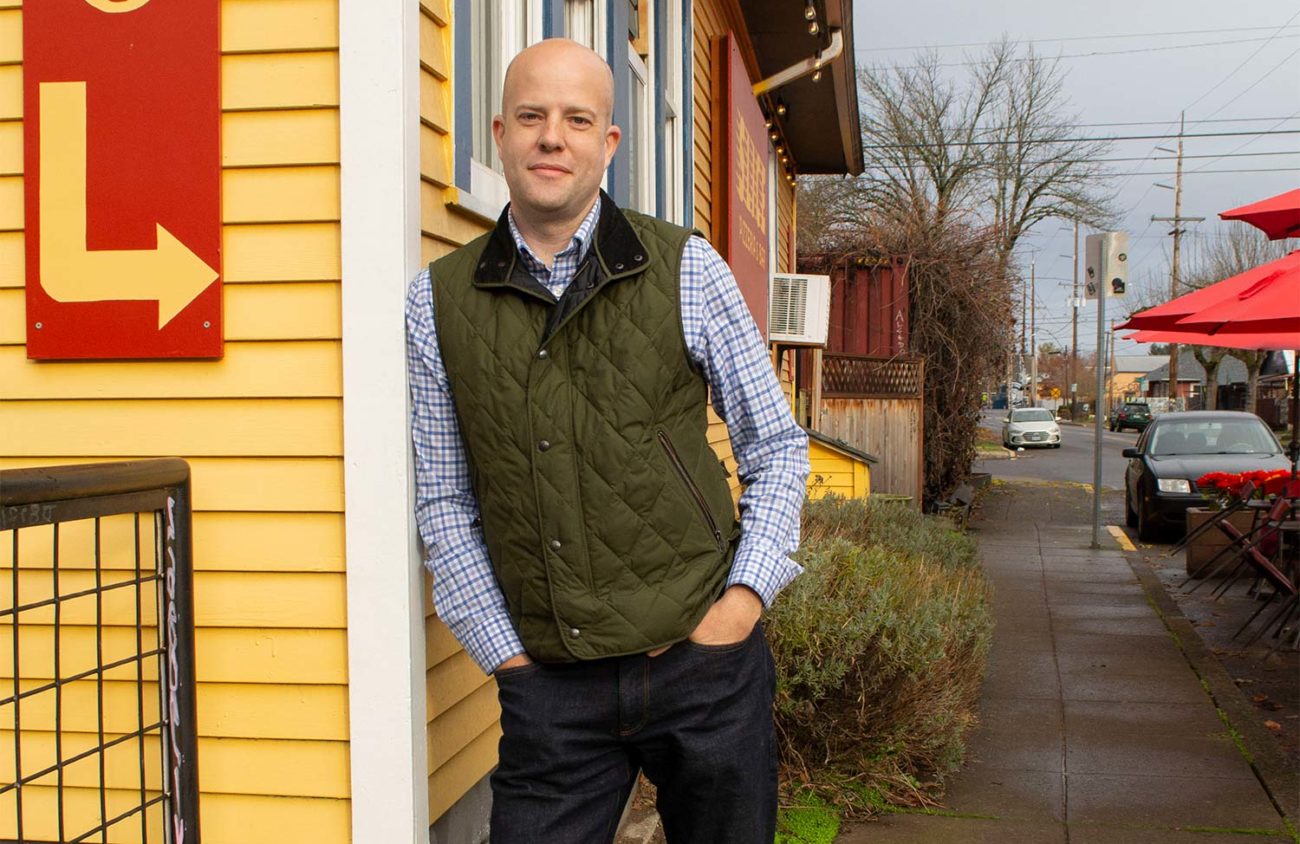Daniel Isaacson, one of the applicants to be the interim Eugene city councilor for Ward 7, started his run by spending three weekends knocking on doors and talking to constituents in the River Road neighborhood in which he lives.
Their responses, Isaacson says, will inform the issues he would prioritize if he is selected.
“The theme that I’m hearing over and over is folks just want to get back to the nuts and bolts,” Isaacson says. “They want the city to be enforcing its ordinances, making sure that the potholes are filled in.”
Ten Eugene residents applied for the interim position. The Eugene City Council will hold special meetings Dec. 5 to 7 to conduct interviews with the applicants. The council initially voted to interview three candidates — Janet Ayres, Lyndsie Leech and Carol Zorn — but at a Nov. 30 meeting, it added Isaacson and Barbie Walker. The council will hold a meeting and action Dec. 12 to confirm the appointment of the interim councilor.
The last Ward 7 city councilor, Claire Syrett, was recalled earlier this year. The Recall Claire Syrett Campaign ousted her for voting in favor of exploring an expansion of Lane Transit District’s EmX bus line on River Road. On its website, the campaign claimed Syrett actively ignored her constituents.
Isaacson says his experience as a business owner on the board of the River Road Community Organization helps to qualify him for this role. “I’m an employee of the citizens of Ward 7,” Isaacson says. “So, much like any other employee, you need to do what your boss tells you to do.”
During his time knocking on doors in his neighborhood, Isaacson says, road repairs, effective use of city funds and a public safety bond were the top concerns for the residents he spoke to.
One endemic issue Isaacson knew would be an especially hot button issue for Ward 7 constituents was homelessness.
Derek David, owner and operator of an auto repair shop in the Whiteaker neighborhood, says he sees firsthand the effect the undertreated homelessness problem has had on business owners in Eugene. The city’s lack of responsiveness to the homelessness crisis has been worsening the problem, David says, and he hopes the new councilor will prioritize the issue more.
“The sense of urgency isn’t there until there is a crime, a fire or heavy drug activity,” David says. “We the citizens in the neighborhood have to go online and file complaints to non-emergency lines just to get them to respond to things that could be tackled before it gets to that point.”
David says he feels it is imperative that the next council member prioritize this issue, and he’s not alone. Eugene business owners frequently comment at City Council public forums on the effect homelessness has on the attractiveness of the city. Whoever ends up being appointed to the interim councilorship will be inheriting a highly scrutinized representative position.
The project that spurred Syrett’s recall proposed to expand bike lanes and add a bus lane to River Road, as well as a number of other smaller corridor expansion projects throughout the city, to accommodate for a growing population and a city-wide interest in reducing car dependency in Eugene.
Andrew Martin is a development planner for Lane Transit District, the agency responsible for planning and operating bus lines, and is responsible for assessing Eugene residents’ use of existing bus lines as well as surveying their interest in public transportation expansion projects.
Martin says to gauge public sentiment he mailed every resident and business within a half mile of the planned corridor expansion, and received a largely positive response.
“It’s unfortunate that there’s controversy, but we have the community’s interest right now and that’s good,” Martin says. “We’re going to be able to leverage that into some really robust outreach.”
The recall campaign’s voter turnout represented only 29 percent of the more than 13,000 registered voters in the district.
Connecting with their constituencies is a challenge not just for the next Ward 7 councilor. Councilor Randy Groves represents Ward 8, which covers most of west Eugene, and faces his own obstacles when it comes to proactively communicating and serving his district. Groves says he frequently noticed a discrepancy in expectations among constituents.
Groves says he remembers a Labor Day picnic in his ward — he was returning to his table when a woman waved him over, told him she was a Ward 8 resident and she’d never heard from him throughout her time living in the ward.
“I have a Facebook page that I use to try to push information, I’m constantly meeting with not just neighborhood associations, but homeowners associations and other groups in the ward,” Groves says. “But her expectation was that we’d come and knock on their door. It’s hard to knock on 22,000 doors.”
Hard it may be, but Isaacson said proactive engagement would be a cornerstone of his service as a city councilor should he be appointed.
Isaacson is chair of Eugene’s Planning Commission, which also serves as Eugene’s Citizen Involvement Committee. He says increasing citizen participation and awareness of the decisions the commission is making is inherently part of his job, and should be a major part of councilorship.
Codifying in language what effective civic engagement means is one solution Isaacson offered to breach the communication gap between city staff and their constituencies, on top of just being a more publicly available public figure.
“I can’t drag them to City Hall. I get that. But there’s some complaints the other side has that I think have validity,” Isaacson says. “We, the city staff, can make ourselves more available. We can codify what civic engagement means on some of these ordinances and the work that we do.”
Whoever is appointed to the interim position will serve until Ward 7 elects a councilor in a May 2023 election.
This article has been updated to add that the Eugene City Council is now interviewing five candidates.
